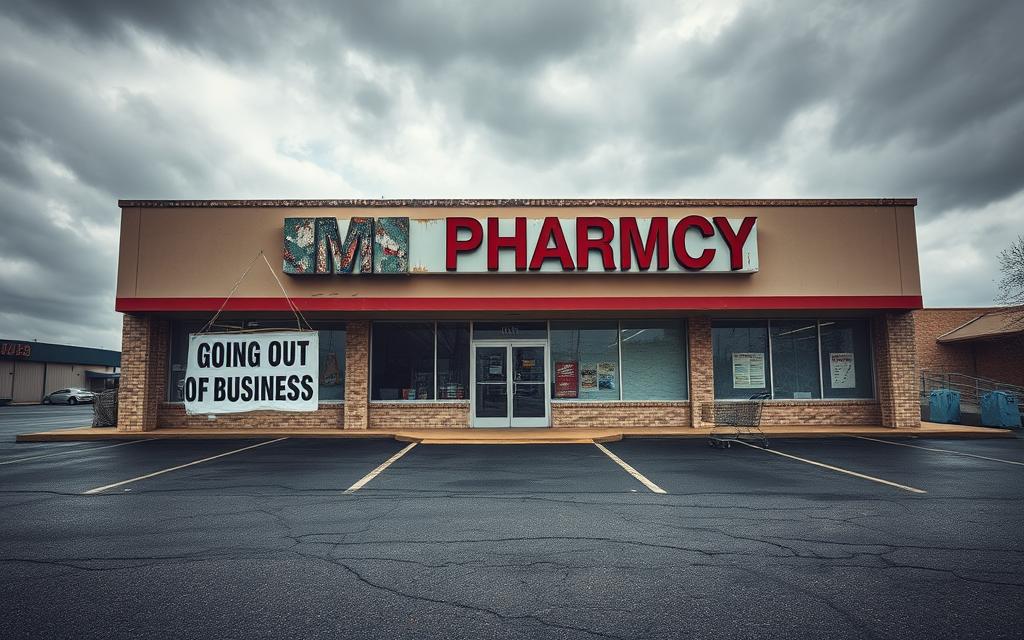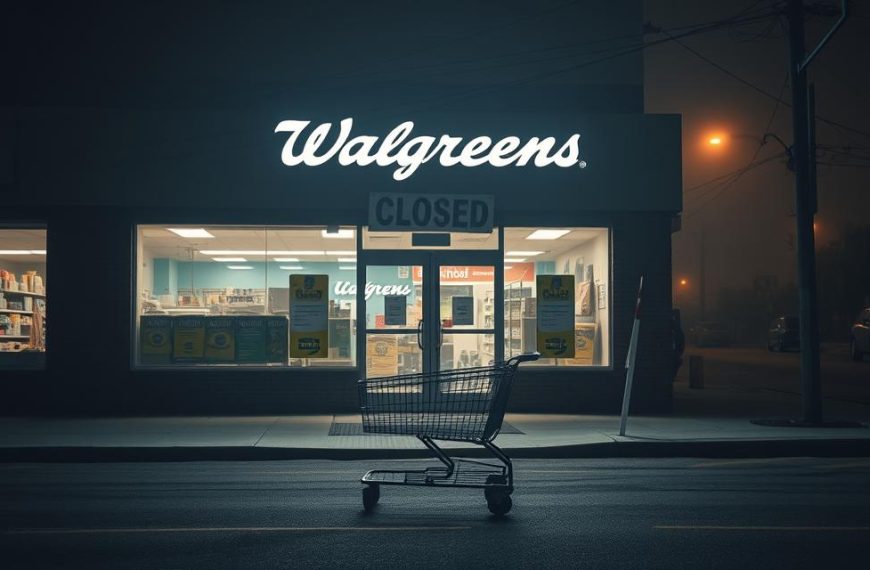Rite Aid, a well-established pharmacy chain in the United States, has been facing significant financial challenges, leading to widespread speculation about its future.
The company has announced a further string of store closures as part of its ongoing bankruptcy process, with an additional 114 locations marked for closure.
This development follows Rite Aid’s decision to enter Chapter 11 bankruptcy proceedings for the second time, having done so initially in October 2023. As a result, the company is selling off and closing its roughly 1,200 locations.
The situation has raised concerns among customers, employees, and the wider retail community, with many wondering what the future holds for this iconic pharmacy retailer.
Rite Aid’s Financial Crisis
Rite Aid’s financial crisis has been unfolding amidst a changing retail landscape. The once-thriving drugstore chain has struggled to stay afloat in a market dominated by larger competitors.
The Bankruptcy Filing
In 2023, Rite Aid declared bankruptcy, citing a significant debt load and high rents for underperforming stores as primary reasons. The company had previously operated nearly 5,000 stores nationally, but this number had dwindled to around 2,100 by the time of the bankruptcy filing.
Factors Leading to Financial Troubles
Several factors contributed to Rite Aid’s financial decline. The company’s debt burden, largely resulting from acquisitions and refinancing challenges, played a significant role. Changing consumer behaviours and the rise of online retail also impacted the traditional drugstore chain. Competitive pressures from larger pharmacy chains like CVS and Walgreens, as well as from retailers like Walmart and Amazon, further exacerbated the situation. Additionally, Rite Aid faced real estate challenges, including high rent costs for underperforming locations and difficulties in optimising their store portfolio. Industry-specific challenges such as prescription reimbursement rates, drug pricing pressures, and regulatory changes also affected profitability.
- Debt burden from acquisitions and refinancing challenges
- Changing consumer behaviours and rise of online retail
- Competitive pressures from larger pharmacy chains and retailers
- Real estate challenges, including high rent costs
- Industry-specific challenges affecting profitability
Rite Aid’s previous financial struggles and attempted turnaround strategies ultimately proved insufficient, leading to the bankruptcy filing.
Is Rite Aid Going Out of Business?
As Rite Aid undergoes significant restructuring, concerns about its survival have intensified. The pharmacy chain has been navigating its financial crisis through a Chapter 11 bankruptcy filing.
Chapter 11 Bankruptcy Process Explained
The Chapter 11 bankruptcy process allows Rite Aid to restructure its debts and operations. This involves reorganizing its business to become more financially stable. The process includes assessing its assets and liabilities and determining the best course of action for its future operations.
Asset Disposal and Store Closures
Rite Aid has been disposing of its assets and closing underperforming stores. Many of its locations and pharmacy assets, including prescription files, have been sold to competitors like CVS and Walgreens. The company recently received court approval to sell its Thrifty Ice Cream brand for $19 million. The closure of numerous stores has raised concerns about the creation of “pharmacy deserts” in affected communities.
Latest Wave of Store Closures
As Rite Aid continues to struggle financially, the company has announced a new round of store closures across various regions. This move is part of the company’s efforts to restructure its business and mitigate financial losses.
July 2024 Closure Announcement
In July 2024, Rite Aid announced the closure of several stores, citing financial difficulties. The announcement was made via text message to loyal customers, as seen in the case of the Rite Aid store at 914 Fair Oaks Ave, which received the message: “Rite Aid at 914 Fair Oaks Ave. has closed.” Although the pharmacy had closed immediately, the store remained open with up to 90% discounts on remaining inventory until August 24.
Timeline for Store Shutdowns
The timeline for store shutdowns varies by location. Employees at certain locations in Pennsylvania and Connecticut have indicated that they expect to close in August. The closure process typically involves a phased approach, with some stores closing immediately while others remain open for weeks or months after the announcement. Factors such as lease terms, inventory levels, and the sale of assets to competitors can influence the timeline for closures.
| Location | Closure Date | Status |
|---|---|---|
| 914 Fair Oaks Ave | July 2024 | Closed |
| Main Street, Pennsylvania | August 2024 | Expected Closure |
| 3rd Street, Connecticut | August 2024 | Expected Closure |
As the situation continues to unfold, customers and employees alike are left to navigate the uncertainty surrounding Rite Aid’s future on Main Street and beyond.
Geographic Impact of Closures
The geographic impact of Rite Aid’s store closures is a pressing concern, with numerous communities facing reduced access to essential pharmacy services. As the pharmacy landscape continues to evolve, understanding the effects of these closures on different regions is crucial.
Most Affected States and Regions
Rite Aid’s store closures have disproportionately affected certain states and regions. The table below highlights the top 5 states with the most Rite Aid store closures in recent years.
| State | Number of Closures |
|---|---|
| California | 120 |
| New York | 90 |
| Texas | 80 |
| Florida | 70 |
| Pennsylvania | 60 |
The Creation of “Pharmacy Deserts”
The closure of Rite Aid stores contributes to the growing issue of “pharmacy deserts,” where communities lack sufficient access to pharmacies
What Happens to Rite Aid’s Assets
With Rite Aid facing financial turmoil, the disposition of its assets is a critical issue. The company’s bankruptcy process involves the sale of various assets to help address its financial obligations.
Sale of Locations to Competitors
Rite Aid is in the process of selling some of its store locations to competitors. This move is part of the company’s restructuring efforts, aimed at reducing its operational footprint and generating capital to pay off debts. The sale of these locations is expected to be completed in the coming months, with several competitors expressing interest in acquiring Rite Aid’s stores.
| Competitor | Number of Stores Acquired | Location |
|---|---|---|
| CVS Pharmacy | 100 | Northeast United States |
| Walgreens | 50 | West Coast United States |
The Future of Thrifty Ice Cream
Late last month, Rite Aid received court approval to sell its beloved Thrifty Ice Cream brand for $19 million. Thrifty Ice Cream, known for its unique flavours such as Black Cherry and Coconut Pineapple, has been a nostalgic favourite among customers for many years. The brand’s sale is expected to be a significant development in the ice cream market. Fans of Thrifty Ice Cream are hopeful that the new owner will continue to produce the iconic ice cream, potentially expanding its availability to new locations.
The sale of Thrifty Ice Cream is a positive development for fans of the brand, who have grown attached to its unique flavours and nostalgic appeal. As the process of transferring ownership unfolds, customers can look forward to enjoying their favourite ice cream in the time to come.
Conclusion: The Future of Rite Aid and Community Impact
The recent wave of closures has raised concerns about Rite Aid’s long-term sustainability. As the company navigates its financial crisis, the future remains uncertain. With numerous store closures, Rite Aid’s viability as a major pharmacy chain is under scrutiny. The loss of local stores not only affects customers but also long-term employees, some of whom have spent over 30 years with the company. The closure also impacts community institutions like Thrifty Ice Cream counters. As news of Rite Aid’s struggles continues to spread, the retail landscape is seen to be changing.











